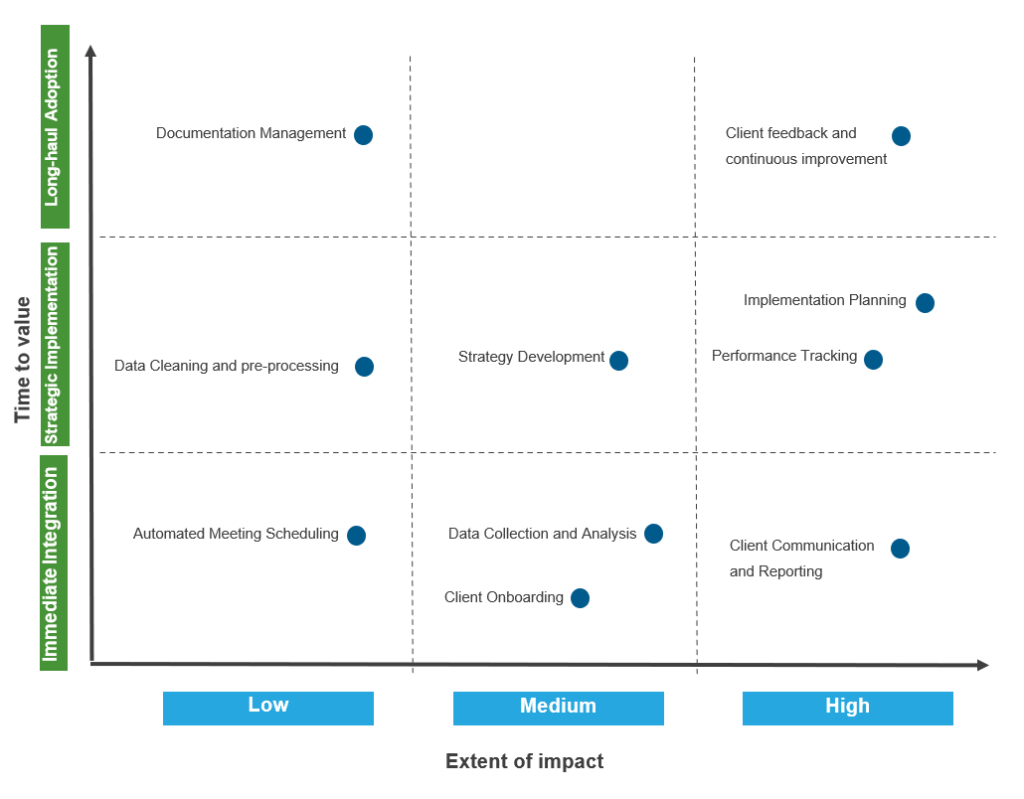
Generative Artificial Intelligence (GAI) has the potential to revolutionize strategic decision-making and consulting. With its power to simulate business scenarios and generate comprehensive data, GAI can be a game-changer for functions ranging from client onboarding to performance tracking. This blog explores the profound implications of GAI in digital transformation consulting, highlighting opportunities and addressing ethical and regulatory considerations.
To learn about use cases and the potential of GAI technology watch our webinar, Welcoming the AI Summer: How Generative AI is Transforming Experiences.
Consulting firms are embracing innovative approaches like GAI to enhance their value propositions. By combining human intelligence with AI capabilities, GAI is a ground-breaking technology offering an exciting future.
While challenges and investments are inevitable, early adopters stand to gain immense rewards, accelerating the industry’s growth and gaining a competitive advantage in the digital era. Continue reading to learn more.
Unleashing the power of GAI for strategic decision-making
By leveraging GAI’s capabilities, consultants can navigate the intricate labyrinth of available data, making sense of multifaceted patterns and trends that would otherwise remain elusive. With its proficiency in generating data and simulating varied business scenarios, GAI can offer strategic insights that can bolster enterprises’ decision-making processes.
These potential benefits are presented in a 3×3 framework that maps the impact and adoption rate of GAI in various consulting processes, as illustrated below:
Mapping the impact and adoption timeline of generative AI in consulting

Navigating ethical and regulatory considerations
As we venture into the GAI era, maintaining ethical and regulatory balance is critical.
The following four considerations must be taken into account:
- Data privacy – As GAI models rely heavily on data, sensitive data could be involved in a consulting scenario. Consulting firms must ensure robust data governance policies and procedures are in place, including measures for data anonymization and secure data handling
- Algorithmic bias – GAI models, like all machine learning models, are only as good as the data they are trained on. If the training data contains biases, the AI models can inadvertently perpetuate these biases, leading to unfair or even harmful outcomes. To mitigate this, consulting firms must regularly audit their AI models, ensuring any biases are detected and corrected promptly
- Transparency or explainability – Clients may mistrust AI’s opaque decision-making processes, especially when AI’s recommendations significantly influence strategic decisions. To overcome this challenge, consulting firms should consider adopting explainable AI technologies that can shed light on the “black box” of AI, enhancing transparency, and building trust
- Regulatory compliance – Adhering to varying regulatory standards across regions and sectors is imperative. Consulting firms need a comprehensive understanding of relevant regulations in their jurisdictions and ensure that they adhere to these rules
The future of consulting
Integrating GAI into consulting can reshape the industry’s skill requirements, service offerings, and delivery models. The table below provides a glimpse of these potential changes:
| Aspect | Current State | Potential Future State with Generative AI | Key Changes | Business Impact |
| Skills | Heavily relies on human expertise and analysis | Greater need for data science, AI expertise, and understanding of AI in a business context | Development of AI-related skills, especially understanding and managing AI tools and algorithms | Enhanced data-driven decision-making, improved efficiency, more sophisticated analysis |
| Service offerings | Traditional consulting services | Expanded offerings with AI-powered services such as predictive analysis, scenario generation, and more | Addition of AI-enabled services to the portfolio, transforming the way consulting services are designed and delivered | Diversified service offerings, potential for new revenue streams, increased competitive edge |
| Delivery models | Primarily human-led engagements | Hybrid model with AI augmenting human-led engagements, enabling more efficient and impactful delivery | Transition to a blended delivery model with AI augmenting human expertise, redefining the consultant’s role | Increased client engagement, enhanced value delivery, improved scalability |
| Client engagement | Personalized, but time-intensive interactions | AI-enabled personalization in real-time, optimizing engagement through AI tools like chatbots and virtual assistants | Implementation of AI in client interactions, necessitating changes in engagement strategies | Enhanced client experience, real-time interactions, increased client satisfaction |
| Data analysis | Manual data analysis, potentially time-consuming and error-prone | AI-powered data analysis, providing accurate insights quickly and efficiently | Incorporation of AI tools in data analysis, enhancing speed and accuracy | Improved insights, faster decision-making, increased reliability |
| Business development | Traditional methods of identifying and pursuing opportunities | AI-enabled opportunity identification and business development strategies | Adoption of AI tools for market research, lead generation, and opportunity analysis | More effective business development, increased revenue, higher growth potential |
| Continuous learning and improvement | Based on feedback and personal experience | AI-facilitated learning from every engagement, leading to continuous improvement of consulting methodologies | Integration of AI tools for feedback analysis and learning, enhancing the consulting approach | Continual improvement, staying relevant, higher client satisfaction |
Positive outlook for generative AI in consulting
Adopting GAI in consulting can be a game-changer, offering a competitive edge and driving industry growth by delivering superior value. However, remember these potential rewards are not without risks. Firms must consider the significant investments in technology and skills development, as well as navigate the intricate ethical and regulatory landscape.
As digital transformation consulting firms set sail on their journey to integrate GAI into their operations, proactively understanding and adopting these advanced technologies can set them apart. By navigating the challenges and capitalizing on the immense potential of Generative AI in consulting, firms can seize the opportunity to lead in this new era of digital transformation consulting.
To discuss Generative AI in consulting, contact [email protected], and mailto:[email protected].
Don’t miss our virtual event, The Possibilities for Generative AI in Sourcing, to learn about opportunities to integrate generative AI into sourcing processes.








